心理学专业(英语)术语
心理学专业英语词汇
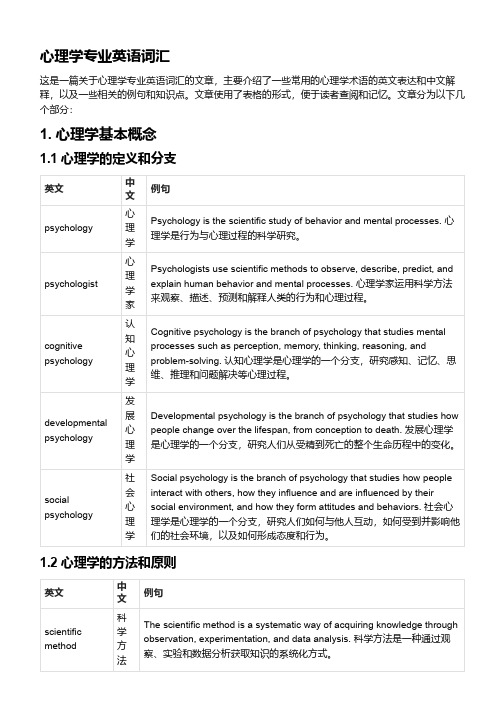
心理学专业英语词汇这是一篇关于心理学专业英语词汇的文章,主要介绍了一些常用的心理学术语的英文表达和中文解释,以及一些相关的例句和知识点。
文章使用了表格的形式,便于读者查阅和记忆。
文章分为以下几个部分:1. 心理学基本概念1.1 心理学的定义和分支英文中文例句psychology 心理学Psychology is the scientific study of behavior and mental processes. 心理学是行为与心理过程的科学研究。
psychologist 心理学家Psychologists use scientific methods to observe, describe, predict, and explain human behavior and mental processes. 心理学家运用科学方法来观察、描述、预测和解释人类的行为和心理过程。
cognitive psychology 认知心理学Cognitive psychology is the branch of psychology that studies mentalprocesses such as perception, memory, thinking, reasoning, andproblem-solving. 认知心理学是心理学的一个分支,研究感知、记忆、思维、推理和问题解决等心理过程。
developmental psychology 发展心理学Developmental psychology is the branch of psychology that studies how people change over the lifespan, from conception to death. 发展心理学是心理学的一个分支,研究人们从受精到死亡的整个生命历程中的变化。
social psychology 社会心理学Social psychology is the branch of psychology that studies how people interact with others, how they influence and are influenced by theirsocial environment, and how they form attitudes and behaviors. 社会心理学是心理学的一个分支,研究人们如何与他人互动,如何受到并影响他们的社会环境,以及如何形成态度和行为。
心理学英语词汇大全揭秘心理学术语深入了解人类思维与行为
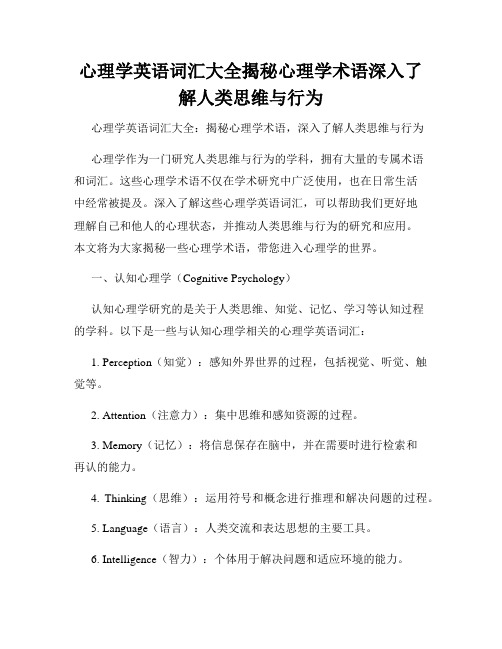
心理学英语词汇大全揭秘心理学术语深入了解人类思维与行为心理学英语词汇大全:揭秘心理学术语,深入了解人类思维与行为心理学作为一门研究人类思维与行为的学科,拥有大量的专属术语和词汇。
这些心理学术语不仅在学术研究中广泛使用,也在日常生活中经常被提及。
深入了解这些心理学英语词汇,可以帮助我们更好地理解自己和他人的心理状态,并推动人类思维与行为的研究和应用。
本文将为大家揭秘一些心理学术语,带您进入心理学的世界。
一、认知心理学(Cognitive Psychology)认知心理学研究的是关于人类思维、知觉、记忆、学习等认知过程的学科。
以下是一些与认知心理学相关的心理学英语词汇:1. Perception(知觉):感知外界世界的过程,包括视觉、听觉、触觉等。
2. Attention(注意力):集中思维和感知资源的过程。
3. Memory(记忆):将信息保存在脑中,并在需要时进行检索和再认的能力。
4. Thinking(思维):运用符号和概念进行推理和解决问题的过程。
5. Language(语言):人类交流和表达思想的主要工具。
6. Intelligence(智力):个体用于解决问题和适应环境的能力。
二、社会心理学(Social Psychology)社会心理学研究的是人类在社会环境中的思维、感知、行为等。
下面是一些与社会心理学相关的心理学英语词汇:1. Social interaction(社会互动):人与人之间的交流和相互作用。
2. Attitude(态度):个体对特定对象或问题的评价。
3. Stereotype(刻板印象):对特定群体的固定而简化的看法。
4. Prejudice(偏见):基于刻板印象而产生的对他人的不公平或负面评价。
5. Group dynamics(群体动力学):研究群体中个体相互影响的过程。
6. Conformity(从众):个体基于群体压力而改变自己的行为或观点。
三、发展心理学(Developmental Psychology)发展心理学研究的是人类在不同年龄阶段的身心变化和发展规律。
心理学英语的名词解释
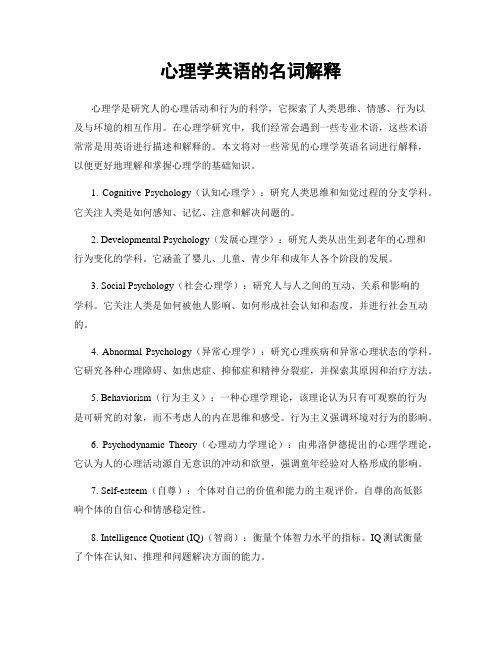
心理学英语的名词解释心理学是研究人的心理活动和行为的科学,它探索了人类思维、情感、行为以及与环境的相互作用。
在心理学研究中,我们经常会遇到一些专业术语,这些术语常常是用英语进行描述和解释的。
本文将对一些常见的心理学英语名词进行解释,以便更好地理解和掌握心理学的基础知识。
1. Cognitive Psychology(认知心理学):研究人类思维和知觉过程的分支学科。
它关注人类是如何感知、记忆、注意和解决问题的。
2. Developmental Psychology(发展心理学):研究人类从出生到老年的心理和行为变化的学科。
它涵盖了婴儿、儿童、青少年和成年人各个阶段的发展。
3. Social Psychology(社会心理学):研究人与人之间的互动、关系和影响的学科。
它关注人类是如何被他人影响、如何形成社会认知和态度,并进行社会互动的。
4. Abnormal Psychology(异常心理学):研究心理疾病和异常心理状态的学科。
它研究各种心理障碍、如焦虑症、抑郁症和精神分裂症,并探索其原因和治疗方法。
5. Behaviorism(行为主义):一种心理学理论,该理论认为只有可观察的行为是可研究的对象,而不考虑人的内在思维和感受。
行为主义强调环境对行为的影响。
6. Psychodynamic Theory(心理动力学理论):由弗洛伊德提出的心理学理论,它认为人的心理活动源自无意识的冲动和欲望,强调童年经验对人格形成的影响。
7. Self-esteem(自尊):个体对自己的价值和能力的主观评价。
自尊的高低影响个体的自信心和情感稳定性。
8. Intelligence Quotient (IQ)(智商):衡量个体智力水平的指标。
IQ测试衡量了个体在认知、推理和问题解决方面的能力。
9. Conditioning(条件化):一种学习过程,即通过后果和奖惩来塑造和调节个体行为。
有两种类型的条件反射:经典条件反射和操作条件反射。
心理学专业英语
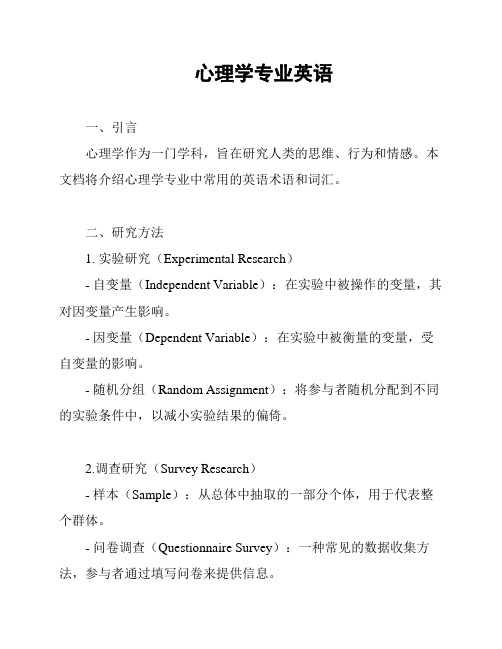
心理学专业英语一、引言心理学作为一门学科,旨在研究人类的思维、行为和情感。
本文档将介绍心理学专业中常用的英语术语和词汇。
二、研究方法1. 实验研究(Experimental Research)- 自变量(Independent Variable):在实验中被操作的变量,其对因变量产生影响。
- 因变量(Dependent Variable):在实验中被衡量的变量,受自变量的影响。
- 随机分组(Random Assignment):将参与者随机分配到不同的实验条件中,以减小实验结果的偏倚。
2.调查研究(Survey Research)- 样本(Sample):从总体中抽取的一部分个体,用于代表整个群体。
- 问卷调查(Questionnaire Survey):一种常见的数据收集方法,参与者通过填写问卷来提供信息。
三、主要理论1.行为主义(Behaviorism)- 刺激-反应(Stimulus-Response):行为主义认为,行为是对刺激的直接反应。
2.认知心理学(Cognitive Psychology)- 情绪(Emotion):主观体验和生理反应的一种状态,通常与特定刺激有关。
- 记忆(Memory):对于信息的编码、存储和检索能力。
- 研究(Learning):通过经验和实践获取知识和技能的过程。
四、发展领域1.临床心理学(Clinical Psychology)- 临床评估(Clinical Assessment):通过各种测试和观察手段,评估个体的心理状况。
- 治疗(Therapy):利用心理和行为干预手段,帮助个体解决心理困扰。
2.社会心理学(Social Psychology)- 社会认知(Social Cognition):研究个体如何感知、记忆和思考与他人相关的信息。
五、结论本文档提供了心理学专业常用英语术语和词汇的简要介绍,希望能帮助读者更好地理解和研究心理学领域的知识。
参考文献:- Smith, J. (2010). Introduction to Psychology. Publisher.- Johnson, L. (2015). Key Concepts in Cognitive Psychology. Publisher.。
(完整版)心理学专业英语词汇
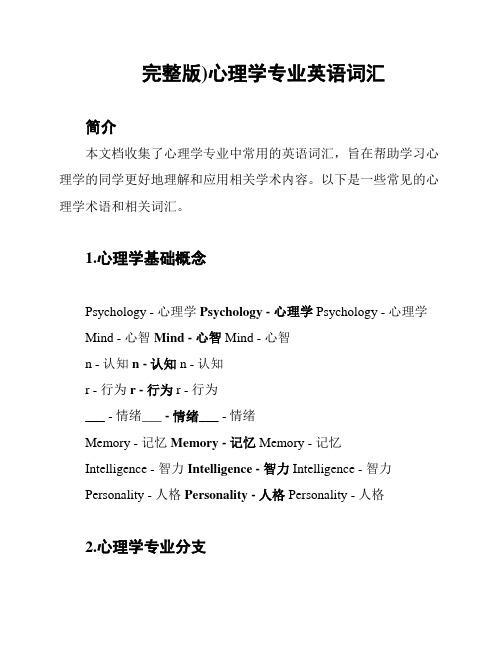
完整版)心理学专业英语词汇简介本文档收集了心理学专业中常用的英语词汇,旨在帮助学习心理学的同学更好地理解和应用相关学术内容。
以下是一些常见的心理学术语和相关词汇。
1.心理学基础概念Psychology - 心理学Psychology - 心理学Psychology - 心理学Mind - 心智Mind - 心智Mind - 心智n - 认知n - 认知n - 认知r - 行为r - 行为r - 行为___ - 情绪___ - 情绪___ - 情绪Memory - 记忆Memory - 记忆Memory - 记忆Intelligence - 智力Intelligence - 智力Intelligence - 智力Personality - 人格Personality - 人格Personality - 人格2.心理学专业分支___ - 发展心理学___ - 发展心理学___ - 发展心理学___ - 社会心理学___ - 社会心理学___ - 社会心理学___ - 认知心理学___ - 认知心理学___ - 认知心理学___ - 临床心理学___ - 临床心理学___ - 临床心理学___ - 教育心理学___ - 教育心理学___ - 教育心理学Industrial-___(I/O) Psychology - 工业组织心理学Industrial-___(I/O) Psychology - 工业组织心理学Industrial-___(I/O) Psychology - 工业组织心理学___ - 神经心理学___ - 神经心理学___ - 神经心理学3.心理学研究方法___ - 实验___ - 实验___ - 实验Survey - 调查Survey - 调查Survey - 调查n - 观察n - 观察n - 观察Interview - 访谈Interview - 访谈Interview - 访谈nnaire - 问卷nnaire - 问卷nnaire - 问卷n - 相关性n - 相关性n - 相关性Statistical Analysis - 统计分析Statistical Analysis - 统计分析Statistical Analysis - 统计分析Sample - 样本Sample - 样本Sample - 样本n - 总体n - 总体n - 总体4.心理学理论Psychoanalysis - 精神分析Psychoanalysis - 精神分析Psychoanalysis - 精神分析rism - 行为主义rism - 行为主义rism - 行为主义___ - 认知理论___ - 认知理论___ - 认知理论___ - 人本主义心理学___ - 人本主义心理学___ - 人本主义心理学___ - 生物心理学___ - 生物心理学___ - 生物心理学___ - 进化心理学___ - 进化心理学___ - 进化心理学Social learning theory - 社会学习理论Social learning theory - 社会学习理论Social learning theory - 社会学习理论5.心理学诊断和治疗方法Diagnosis - 诊断Diagnosis - 诊断Diagnosis - 诊断___ - 治疗___ - 治疗___ - 治疗Counseling - 咨询Counseling - 咨询Counseling - 咨询___ - 心理治疗___ - 心理治疗___ - 心理治疗___ - 药物治疗___ - 药物治疗___ - 药物治疗___ (CBT) - 认知行为疗法___ (CBT) - 认知行为疗法___ (CBT) - 认知行为疗法Group ___ - 团体疗法Group ___ - 团体疗法Group ___ - 团体疗法___ - 艺术疗法___ - 艺术疗法___ - 艺术疗法6.心理学实验设计Independent Variable - 自变量Independent Variable - 自变量Independent Variable - 自变量___ Variable - 因变量___ Variable - 因变量___ Variable - 因变量Control Group - 对照组Control Group - 对照组Control Group - 对照组Experimental Group - 实验组Experimental Group - 实验组Experimental Group - 实验组Random Assignment - 随机分配Random Assignment - 随机分配Random Assignment - 随机分配Single-Blind Study - 单盲研究Single-Blind Study - 单盲研究Single-Blind Study - 单盲研究Double-Blind Study - 双盲研究Double-Blind Study - 双盲研究Double-Blind Study - 双盲研究7.心理测量与评估Psychological Assessment - 心理测量Psychological Assessment - 心理测量Psychological Assessment - 心理测量Intelligence Test - 智力测试Intelligence Test - 智力测试Intelligence Test - 智力测试Personality Test - 人格测验Personality Test - 人格测验Personality Test - 人格测验Psychological Test - 心理测验Psychological Test - 心理测验Psychological Test - 心理测验Validity - 有效性Validity - 有效性Validity - 有效性Reliability - 可靠性Reliability - 可靠性Reliability - 可靠性___ - 标准化___ - 标准化___ - 标准化以上是一些常用的心理学专业英语词汇,希望对学习心理学的同学有所帮助。
心理学专业术语

心理学专业术语以下是一些著名的心理学专业术语:1. 自我实现(Self-actualization)由马斯洛提出的概念,指人类实现其潜力、追求个人成长和自我完善的最高需求。
2. 潜意识(Unconscious)弗洛伊德提出的概念,指不为个人意识到的精神活动,但对个体的行为和情感有重大影响。
3. 条件反射(Conditioned Reflex)巴甫洛夫提出的概念,指通过学习形成的对某种刺激的反应。
4. 认知失调(Cognitive Dissonance)由费斯廷格提出,指个体同时持有相互冲突的信念、态度或行为时产生的心理不适。
5. 自我效能感(Self-efficacy班杜拉提出的概念,指个人对自己在特定情境下成功执行行为的能力的信念。
6. 经典条件作用(Classical Conditioning)也是由巴甫洛夫提出,指通过重复将中性刺激与非条件刺激配对,从而使中性刺激引发类似非条件刺激反应的学习过程。
7. 操作性条件作用(Operant Conditioning)斯金纳提出的概念,指行为的后果(如奖励或惩罚)影响该行为未来发生的概率。
8. 社会认知理论(Social Cognitive Theory)由班杜拉提出,认为人类行为是通过观察他人的行为、后果和环境来学习的。
9. 投射(Projection)弗洛伊德提出的防御机制之一,指将自己的不安或冲突投射到他人或外部事物上。
10. 本能(Instinct)弗洛伊德理论中的概念,指由无意识推动的、影响行为的原始动力,如生的本能和死的本能。
11. 人格五因素模型(Big Five Personality Traits)一种广泛接受的人格结构理论,认为人格由五个维度组成:开放性、尽责性、外向性、宜人性和神经质。
12. 认知行为疗法(Cognitive Behavioral Therapy, CBT)一种心理治疗方法,旨在通过改变不良的认知模式和行为来改善情绪和心理健康。
心理学专业英语总结(完整)
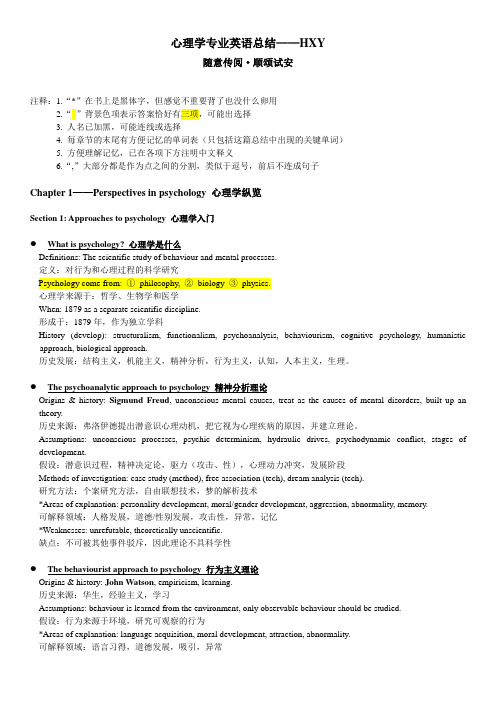
心理学专业英语总结——HXY随意传阅·顺颂试安注释:1.“*”在书上是黑体字,但感觉不重要背了也没什么卵用2.“”背景色项表示答案恰好有三项,可能出选择3. 人名已加黑,可能连线或选择4. 每章节的末尾有方便记忆的单词表(只包括这篇总结中出现的关键单词)5. 方便理解记忆,已在各项下方注明中文释义6.“,”大部分都是作为点之间的分割,类似于逗号,前后不连成句子Chapter 1——Perspectives in psychology 心理学纵览Section 1: Approaches to psychology 心理学入门●What is psychology? 心理学是什么Definitions: The scientific study of behaviour and mental processes.定义:对行为和心理过程的科学研究Psychology come from: ①philosophy, ②biology ③physics.心理学来源于:哲学、生物学和医学When: 1879 as a separate scientific discipline.形成于:1879年,作为独立学科History (develop): structuralism, functionalism, psychoanalysis, behaviourism, cognitive psychology, humanistic approach, biological approach.历史发展:结构主义,机能主义,精神分析,行为主义,认知,人本主义,生理。
●The psychoanalytic approach to psychology 精神分析理论Origins & history: Sigmund Freud, unconscious mental causes, treat as the causes of mental disorders, built up an theory.历史来源:弗洛伊德提出潜意识心理动机,把它视为心理疾病的原因,并建立理论。
心理学专业名词英语
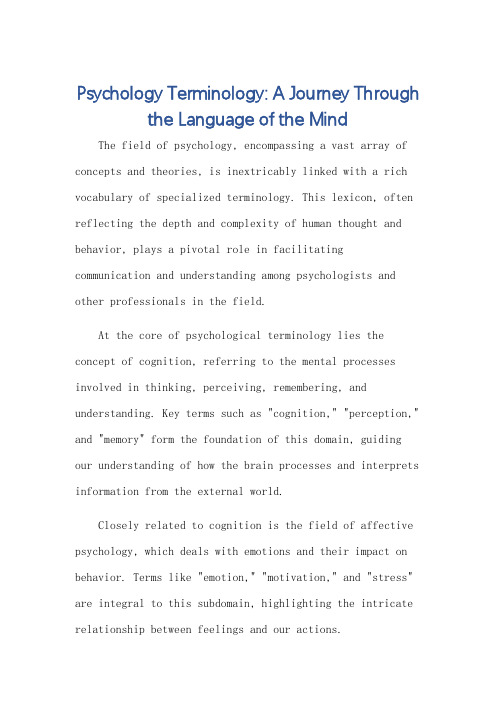
Psychology Terminology: A Journey Through the Language of the MindThe field of psychology, encompassing a vast array of concepts and theories, is inextricably linked with a rich vocabulary of specialized terminology. This lexicon, often reflecting the depth and complexity of human thought and behavior, plays a pivotal role in facilitating communication and understanding among psychologists and other professionals in the field.At the core of psychological terminology lies the concept of cognition, referring to the mental processes involved in thinking, perceiving, remembering, and understanding. Key terms such as "cognition," "perception," and "memory" form the foundation of this domain, guiding our understanding of how the brain processes and interprets information from the external world.Closely related to cognition is the field of affective psychology, which deals with emotions and their impact on behavior. Terms like "emotion," "motivation," and "stress" are integral to this subdomain, highlighting the intricate relationship between feelings and our actions.Developmental psychology, on the other hand, focuses on the psychological changes that occur throughout the lifespan. Key terms in this area include "child development," "adolescence," and "aging," alluding to the distinct stages and challenges encountered during different life stages.Social psychology explores the influence of social factors on individual behavior and cognition. Terms such as "socialization," "group behavior," and "interpersonal relations" are pivotal in this domain, emphasizing the interconnectedness of individuals within social contexts. Clinical psychology, meanwhile, deals with the assessment and treatment of psychological disorders. Terms like "psychopathology," "therapy," and "diagnosis" are central to this subdomain, guiding practitioners in their understanding and management of mental health conditions. The importance of psychological terminology extends beyond the academic realm. It plays a crucial role in everyday life, informing our interactions, decision-making, and understanding of ourselves and others. By delving into the lexicon of psychology, we gain a deeper appreciationfor the complexities of the human mind and the intricate dance of thoughts, feelings, and behaviors that shape our world.**心理学专业名词英语:心灵的语言之旅**心理学领域涵盖了大量的概念和理论,这些理论与一个丰富的专业术语词汇表紧密相连。
psychology词根词缀
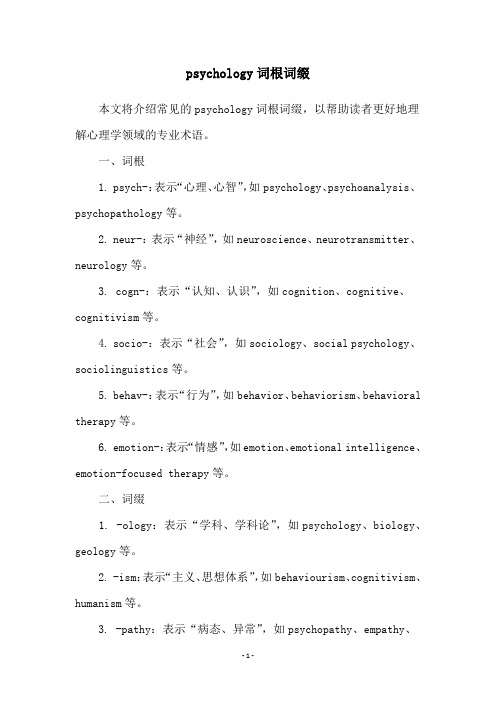
psychology词根词缀本文将介绍常见的psychology词根词缀,以帮助读者更好地理解心理学领域的专业术语。
一、词根1. psych-:表示“心理、心智”,如psychology、psychoanalysis、psychopathology等。
2. neur-:表示“神经”,如neuroscience、neurotransmitter、neurology等。
3. cogn-:表示“认知、认识”,如cognition、cognitive、cognitivism等。
4. socio-:表示“社会”,如sociology、social psychology、sociolinguistics等。
5. behav-:表示“行为”,如behavior、behaviorism、behavioral therapy等。
6. emotion-:表示“情感”,如emotion、emotional intelligence、emotion-focused therapy等。
二、词缀1. -ology:表示“学科、学科论”,如psychology、biology、geology等。
2. -ism:表示“主义、思想体系”,如behaviourism、cognitivism、humanism等。
3. -pathy:表示“病态、异常”,如psychopathy、empathy、sympathy等。
4. -phobia:表示“恐惧症”,如acrophobia、arachnophobia、claustrophobia等。
5. -logy:表示“研究、学说”,如psychology、biology、anthropology等。
6. -psychic:表示“心灵的、超自然的”,如psychic abilities、psychic healing、psychic readings等。
以上是psychology词根词缀的介绍,希望对读者有所帮助。
心理学英语术语
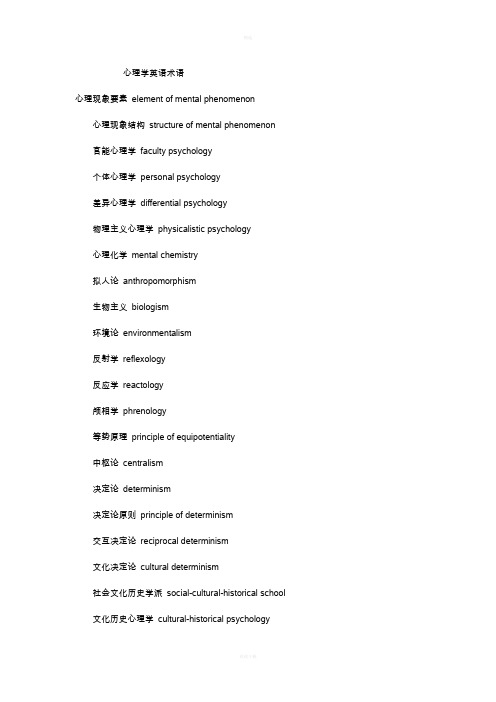
心理学英语术语心理现象要素element of mental phenomenon 心理现象结构structure of mental phenomenon官能心理学faculty psychology个体心理学personal psychology差异心理学differential psychology物理主义心理学physicalistic psychology心理化学mental chemistry拟人论anthropomorphism生物主义biologism环境论environmentalism反射学reflexology反应学reactology颅相学phrenology等势原理principle of equipotentiality中枢论centralism决定论determinism决定论原则principle of determinism交互决定论reciprocal determinism文化决定论cultural determinism社会文化历史学派social-cultural-historical school 文化历史心理学cultural-historical psychology定势理论set theory意向论intentionalism相对论relativism互动论interactionism微型学习理论miniature theory of learning思维边缘理论peripheral theory of thinking点状感觉说theory of punctiform sensation沙赫特情绪实验Schachter's experiment on emotion原子心理学atomistic psychology构造心理学structural psychology内容心理学content psychology内容分析content analysis民族心理学folk psychology屈尔珀学派Külpe school二重心理学dual psychology一种调和折中的心理学,认为心理学应研究兼括内容与意动的广义经验。
心理学英语词汇大全了解心理学领域的基本概念和术语
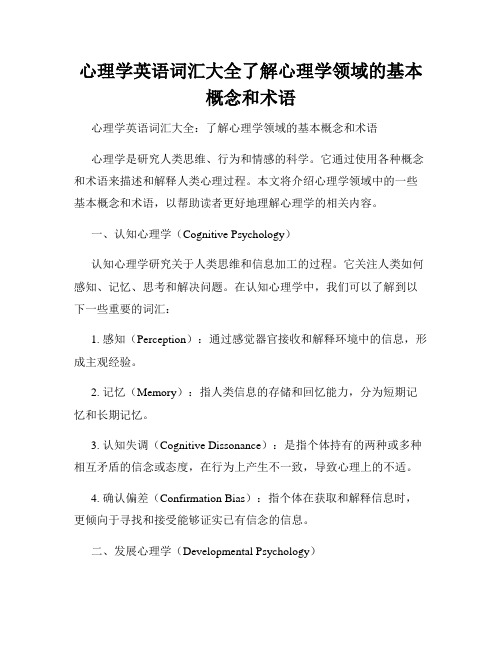
心理学英语词汇大全了解心理学领域的基本概念和术语心理学英语词汇大全:了解心理学领域的基本概念和术语心理学是研究人类思维、行为和情感的科学。
它通过使用各种概念和术语来描述和解释人类心理过程。
本文将介绍心理学领域中的一些基本概念和术语,以帮助读者更好地理解心理学的相关内容。
一、认知心理学(Cognitive Psychology)认知心理学研究关于人类思维和信息加工的过程。
它关注人类如何感知、记忆、思考和解决问题。
在认知心理学中,我们可以了解到以下一些重要的词汇:1. 感知(Perception):通过感觉器官接收和解释环境中的信息,形成主观经验。
2. 记忆(Memory):指人类信息的存储和回忆能力,分为短期记忆和长期记忆。
3. 认知失调(Cognitive Dissonance):是指个体持有的两种或多种相互矛盾的信念或态度,在行为上产生不一致,导致心理上的不适。
4. 确认偏差(Confirmation Bias):指个体在获取和解释信息时,更倾向于寻找和接受能够证实已有信念的信息。
二、发展心理学(Developmental Psychology)发展心理学研究人类从出生到死亡各个阶段的心理和行为变化。
它关注婴儿、儿童、青少年和成年人的发展过程。
以下是一些发展心理学中常用的术语:1. 社会化(Socialization):是指个体学习适应社会的规范和价值观的过程。
2. 成熟(Maturation):指身体和心智随着时间的推移逐渐发展进步,达到最佳状态。
3. 适应性(Adaptation):个体对环境变化做出的心理和生理调整。
4. 分离焦虑(Separation Anxiety):婴儿和幼儿因与主要依赖人分离而出现的不安和恐惧情绪。
三、社会心理学(Social Psychology)社会心理学研究人类如何在社会环境中相互作用,以及个体对他人和群体的态度和行为。
以下是一些社会心理学中常见的概念和术语:1. 自我概念(Self-concept):个体对自我理解和认知的总体观念。
心理学专业词汇(最新整理)

心理学专业词汇(最新整理)1. 心理学(Psychology):研究个体和群体心理过程和行为的学科。
2. 意识(Consciousness):指人类对自身和周围环境的感知和理解。
3. 情感(Emotion):一种主观感受,通常伴随着生理和心理反应。
4. 认知(Cognition):指人类对信息的处理和理解,包括知觉、注意、记忆、思维等。
5. 学习(Learning):通过经验或训练获得知识和技能的过程。
6. 记忆(Memory):将经验和信息储存并在需要时进行提取和回忆的能力。
7. 智力(Intelligence):指个体在解决问题、学习和适应环境方面的能力。
8. 发展心理学(Developmental psychology):研究人类一生中心理过程和行为的变化和发展。
9. 人格(Personality):个体独特的心理特征和行为模式。
10. 社会心理学(Social psychology):研究个体在社会环境中的思维、情感和行为的学科。
11. 临床心理学(Clinical psychology):研究和应用心理学知识,帮助个体解决心理问题和提高心理健康。
12. 心理治疗(Psychotherapy):通过谈话和其他技术方法来解决个体心理问题的过程。
13. 人类发展(Human development):研究个体从出生到死亡的整个生命周期中的物理、认知和情感变化。
14. 注意力(Attention):集中精力和意识的心理过程,用于对外界刺激的选择和加工。
15. 动机(Motivation):驱使人们行为的内在原因和动力。
16. 心理测量(Psychological measurement):使用各种工具和方法来评估个体心理特征和行为。
17. 神经科学(Neuroscience):研究神经系统结构和功能,以及其与心理过程和行为之间的关系。
18. 实验心理学(Experimental psychology):利用实验方法研究心理过程和行为的学科。
高职高专心理学词汇表

高职高专心理学词汇表1. 自尊 (self-esteem)指一个人对自己的价值和能力的评价和认知。
自尊对于一个人的心理健康和自信心至关重要。
2. 压力 (stress)指由于面临各种挑战、困难或紧张情况而引起的身心反应。
压力可能对人的身心健康产生负面影响,但适度的压力也能激发个人的潜力。
3. 焦虑 (anxiety)指由于对未来的担忧、紧张和不安所导致的情绪和心理状态。
焦虑可能会干扰人们的日常生活和工作,需要适当的管理和应对策略。
4. 抑郁 (depression)指一种持续的情绪状态,包括消沉、悲伤和失去兴趣等。
抑郁可能影响人的心理健康和日常功能。
5. 共情 (empathy)指理解和分享他人情感及体验的能力。
共情有助于建立良好的人际关系和沟通,增强人与人之间的亲密度和理解。
6. 倾听 (active listening)指全神贯注地聆听他人讲话并展示出兴趣和理解。
倾听是有效沟通和建立互信关系的关键技巧。
7. 冲突解决 (conflict resolution)指解决个人或团体之间矛盾和分歧的过程。
有效的冲突解决能力有助于促进和谐的人际关系和团队合作。
8. 积极心态 (positive mindset)指积极看待事物、保持乐观态度和寻找解决问题的机会的心理状态。
积极心态有助于应对困难和促进个人成长。
9. 自我调节 (self-regulation)指控制和管理个人的情绪、冲动和行为的能力。
良好的自我调节能力有助于提高个人的幸福感和心理健康。
10. 幸福感 (well-being)指个人感受到的生活满意度和幸福程度。
幸福感与个人的心理和情绪状态密切相关。
以上是一份高职高专心理学词汇表,包括了一些重要的心理学概念和术语。
这些词汇可以帮助人们更好地理解和研究心理学领域的知识。
心理学英语术语

心理学英语术语心理现象要素 element of mental phenomenon心理现象结构 structure of mental phenomenon官能心理学 faculty psychology个体心理学 personal psychology差异心理学 differential psychology物理主义心理学 physicalistic psychology心理化学 mental chemistry拟人论 anthropomorphism生物主义 biologism环境论 environmentalism反射学 reflexology反应学 reactology颅相学 phrenology等势原理 principle of equipotentiality中枢论 centralism决定论 determinism决定论原则 principle of determinism交互决定论 reciprocal determinism文化决定论 cultural determinism社会文化历史学派 social-cultural-historical school文化历史心理学 cultural-historical psychology定势理论 set theory意向论 intentionalism相对论 relativism互动论 interactionism微型学习理论 miniature theory of learning思维边缘理论 peripheral theory of thinking点状感觉说 theory of punctiform sensation沙赫特情绪实验 Schachter's experiment on emotion原子心理学 atomistic psychology构造心理学 structural psychology内容心理学 content psychology内容分析 content analysis民族心理学 folk psychology屈尔珀学派 Külpe school二重心理学 dual psychology一种调和折中的心理学,认为心理学应研究兼括内容与意动的广义经验。
心理学名词术语
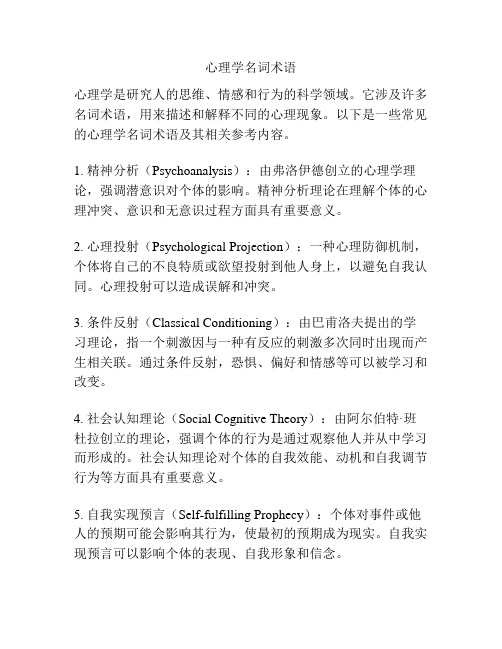
心理学名词术语心理学是研究人的思维、情感和行为的科学领域。
它涉及许多名词术语,用来描述和解释不同的心理现象。
以下是一些常见的心理学名词术语及其相关参考内容。
1. 精神分析(Psychoanalysis):由弗洛伊德创立的心理学理论,强调潜意识对个体的影响。
精神分析理论在理解个体的心理冲突、意识和无意识过程方面具有重要意义。
2. 心理投射(Psychological Projection):一种心理防御机制,个体将自己的不良特质或欲望投射到他人身上,以避免自我认同。
心理投射可以造成误解和冲突。
3. 条件反射(Classical Conditioning):由巴甫洛夫提出的学习理论,指一个刺激因与一种有反应的刺激多次同时出现而产生相关联。
通过条件反射,恐惧、偏好和情感等可以被学习和改变。
4. 社会认知理论(Social Cognitive Theory):由阿尔伯特·班杜拉创立的理论,强调个体的行为是通过观察他人并从中学习而形成的。
社会认知理论对个体的自我效能、动机和自我调节行为等方面具有重要意义。
5. 自我实现预言(Self-fulfilling Prophecy):个体对事件或他人的预期可能会影响其行为,使最初的预期成为现实。
自我实现预言可以影响个体的表现、自我形象和信念。
6. 学习理论(Learning Theory):研究个体如何通过经验和环境的改变来获取和改变行为的理论。
学习理论包括经典条件反射、操作条件反射和认知学习等。
7. 自我概念(Self-Concept):个体对自己认知和评价的总和。
自我概念包括个体的价值观、自我意象和自我认同等方面,对个体的心理健康和行为具有重要意义。
8. 社会认同(Social Identity):个体对于自己所属社会群体的认同感和认同程度。
社会认同可以影响个体的行为、态度和感受,并对个体在群体中的表现产生影响。
9. 团体动力(Group Dynamics):研究个体在群体中相互作用和影响的过程。
英汉翻译:心理学术语
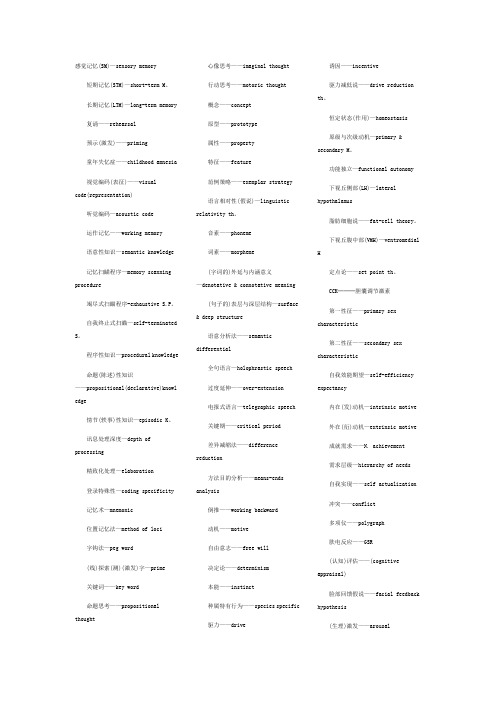
感觉记忆(SM)—sensory memory短期记忆(STM)—short-term M。
长期记忆(LTM)—long-term memory复诵——rehearsal预示(激发)——priming童年失忆症——childhood amnesia视觉编码(表征)——visualcode(representation)听觉编码—acoustic code运作记忆——working memory语意性知识—semantic knowledge记忆扫瞄程序—memory scanning procedure竭尽式扫瞄程序-exhaustive S.P。
自我终止式扫瞄—self-terminated S。
程序性知识—procedural knowledge命题(陈述)性知识——propositional(declarative)knowl edge情节(轶事)性知识—episodic K。
讯息处理深度—depth of processing精致化处理—elaboration登录特殊性—coding specificity记忆术—mnemonic位置记忆法—method of loci字钩法—peg word(线)探索(测)(激发)字—prime关键词——key word命题思考——propositional thought心像思考——imaginal thought行动思考——motoric thought概念——concept原型——prototype属性——property特征——feature范例策略——exemplar strategy语言相对性(假说)—linguisticrelativity th。
音素——phoneme词素——morpheme(字词的)外延与内涵意义—denotative & connotative meaning(句子的)表层与深层结构—surface& deep structure语意分析法——semanticdifferential全句语言—holophrastic speech过度延伸——over-extension电报式语言—telegraphic speech关键期——critical period差异减缩法——differencereduction方法目的分析——means-endsanalysis倒推——working backward动机——motive自由意志——free will决定论——determinism本能——instinct种属特有行为——species specific驱力——drive诱因——incentive驱力减低说——drive reductionth。
心理学专业英语单词
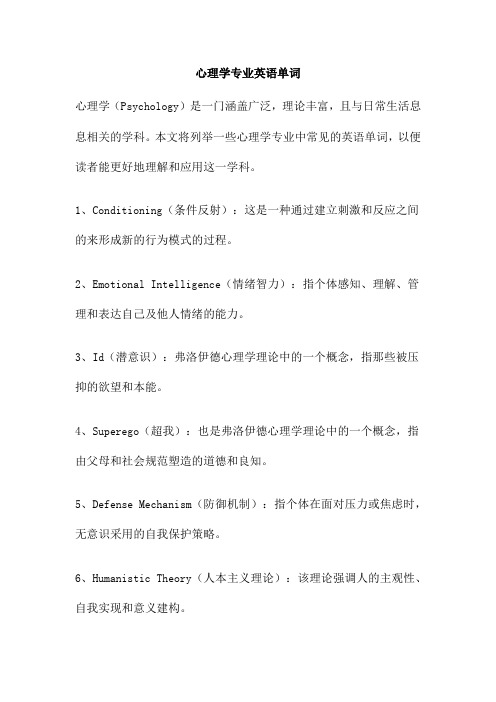
心理学专业英语单词心理学(Psychology)是一门涵盖广泛,理论丰富,且与日常生活息息相关的学科。
本文将列举一些心理学专业中常见的英语单词,以便读者能更好地理解和应用这一学科。
1、Conditioning(条件反射):这是一种通过建立刺激和反应之间的来形成新的行为模式的过程。
2、Emotional Intelligence(情绪智力):指个体感知、理解、管理和表达自己及他人情绪的能力。
3、Id(潜意识):弗洛伊德心理学理论中的一个概念,指那些被压抑的欲望和本能。
4、Superego(超我):也是弗洛伊德心理学理论中的一个概念,指由父母和社会规范塑造的道德和良知。
5、Defense Mechanism(防御机制):指个体在面对压力或焦虑时,无意识采用的自我保护策略。
6、Humanistic Theory(人本主义理论):该理论强调人的主观性、自我实现和意义建构。
7、Behaviorism(行为主义):该理论强调可观察的行为是心理学研究的合适对象。
8、Cognitive Behavioral Therapy(认知行为疗法):一种心理治疗方法,帮助个体识别和改变其消极的思维模式和行为习惯。
9、Psychodynamic Theory(精神分析理论):一种心理学的理论框架,强调潜意识和动机在人类行为中的决定作用。
10、Social Learning Theory(社会学习理论):该理论强调观察和模仿他人行为以获得新的行为模式。
以上仅是心理学专业英语单词的一部分,但通过理解和运用这些词汇,我们可以更好地理解和探索人类心理的奥秘。
电气专业英语单词在电气领域,英语单词的应用是非常重要的。
它不仅是一种语言工具,更是国际交流和知识共享的基础。
以下是一些电气专业英语单词的示例,这些词汇在日常工作中非常常见。
1、Voltage(电压):在电路中,电压是电位差,它驱动电流流动。
通常用伏特(V)表示。
2、Current(电流):流动的电荷称为电流。
心理学专业词汇(最新整理)
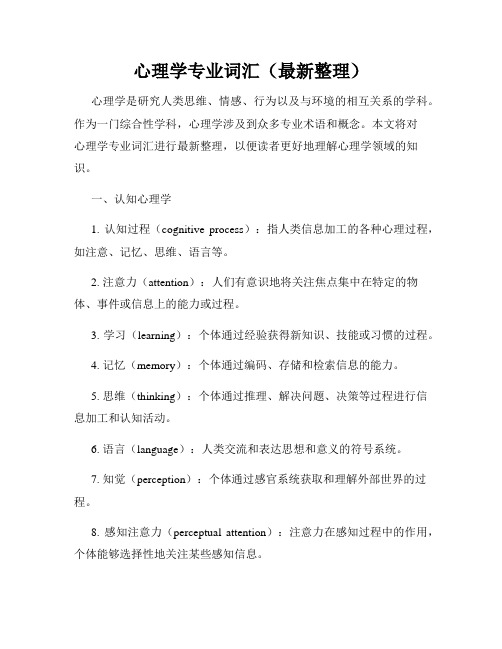
心理学专业词汇(最新整理)心理学是研究人类思维、情感、行为以及与环境的相互关系的学科。
作为一门综合性学科,心理学涉及到众多专业术语和概念。
本文将对心理学专业词汇进行最新整理,以便读者更好地理解心理学领域的知识。
一、认知心理学1. 认知过程(cognitive process):指人类信息加工的各种心理过程,如注意、记忆、思维、语言等。
2. 注意力(attention):人们有意识地将关注焦点集中在特定的物体、事件或信息上的能力或过程。
3. 学习(learning):个体通过经验获得新知识、技能或习惯的过程。
4. 记忆(memory):个体通过编码、存储和检索信息的能力。
5. 思维(thinking):个体通过推理、解决问题、决策等过程进行信息加工和认知活动。
6. 语言(language):人类交流和表达思想和意义的符号系统。
7. 知觉(perception):个体通过感官系统获取和理解外部世界的过程。
8. 感知注意力(perceptual attention):注意力在感知过程中的作用,个体能够选择性地关注某些感知信息。
9. 判断决策(judgment and decision making):个体在面临选择时的思考、评估、决策的过程。
10. 问题解决(problem solving):个体在面对难题或挑战时通过思考和策略来找到解决办法。
二、发展心理学1. 儿童发展(child development):研究人类从婴幼儿期到青少年期各个阶段的生理、认知和社会发展过程。
2. 青少年发展(adolescent development):研究人类从儿童期到成年期的过渡阶段,包括身体、认知和社会发展的变化。
3. 社会性别(gender):指在特定社会和文化背景下,男性和女性所具有的角色和行为特征。
4. 发展障碍(developmental disorders):指发展过程中出现的异常或延迟,如自闭症、学习障碍等。
心理学英语词汇大全解读心理学术语提高心理素养
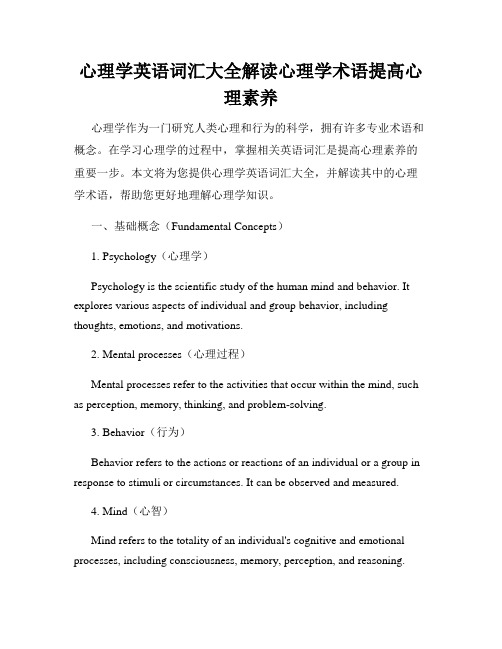
心理学英语词汇大全解读心理学术语提高心理素养心理学作为一门研究人类心理和行为的科学,拥有许多专业术语和概念。
在学习心理学的过程中,掌握相关英语词汇是提高心理素养的重要一步。
本文将为您提供心理学英语词汇大全,并解读其中的心理学术语,帮助您更好地理解心理学知识。
一、基础概念(Fundamental Concepts)1. Psychology(心理学)Psychology is the scientific study of the human mind and behavior. It explores various aspects of individual and group behavior, including thoughts, emotions, and motivations.2. Mental processes(心理过程)Mental processes refer to the activities that occur within the mind, such as perception, memory, thinking, and problem-solving.3. Behavior(行为)Behavior refers to the actions or reactions of an individual or a group in response to stimuli or circumstances. It can be observed and measured.4. Mind(心智)Mind refers to the totality of an individual's cognitive and emotional processes, including consciousness, memory, perception, and reasoning.5. Consciousness(意识)Consciousness is the awareness of oneself and the surrounding environment. It includes both the conscious and unconscious aspects of mental activity.6. Emotion(情绪)Emotion is a complex psychological state involving physiological arousal, subjective feelings, and behavioral expressions. Common emotions include happiness, sadness, anger, fear, and love.二、个体差异(Individual Differences)1. Personality(人格)Personality refers to the unique set of enduring traits, patterns of thoughts, emotions, and behaviors that characterize an individual. It influences how individuals perceive and interact with the world.2. Intelligence(智力)Intelligence refers to the ability to learn, understand, and apply knowledge. It encompasses various cognitive abilities, such as problem-solving, reasoning, and memory.3. Motivation(动机)Motivation refers to the internal or external factors that drive individuals to behave in certain ways. It can be influenced by biological, psychological, and social factors.4. Perception(知觉)Perception is the process of organizing and interpreting sensory information to give meaning to the environment. It involves the senses of sight, hearing, taste, smell, and touch.5. Attention(注意力)Attention refers to the cognitive process of selectively focusing on specific stimuli while ignoring others. It plays a crucial role in information processing and cognitive performance.三、心理发展(Psychological Development)1. Childhood(童年)Childhood refers to the period of life between infancy and adolescence. It is a critical stage of psychological development, during which individuals acquire various cognitive, emotional, and social skills.2. Adolescence(青春期)Adolescence is the transitional period between childhood and adulthood. It is characterized by physical, cognitive, and social changes, as well as the search for identity and independence.3. Learning(学习)Learning is the process of acquiring new knowledge, skills, behaviors, or attitudes through experience, instruction, or observation. It can be classified into various types, such as classical conditioning, operant conditioning, and observational learning.4. Memory(记忆)Memory is the process of encoding, storing, and retrieving information. It consists of sensory memory, short-term memory, and long-term memory. Memory can be influenced by factors such as attention, rehearsal, and retrieval cues.5. Language(语言)Language is a system of communication consisting of words, grammar, and syntax. It plays a fundamental role in cognitive development and social interaction.四、心理健康和疾病(Mental Health and Disorders)1. Stress(压力)Stress is a physiological and psychological response to challenging or threatening situations. Prolonged or excessive stress can have negative effects on mental and physical health.2. Anxiety(焦虑)Anxiety is a feeling of unease, worry, or fear. It can range from mild to severe and can interfere with daily functioning. Anxiety disorders include generalized anxiety disorder, panic disorder, and phobias.3. Depression(抑郁)Depression is a mood disorder characterized by persistent feelings of sadness, loss of interest or pleasure, and a lack of energy. It can significantly impair one's ability to function and enjoy life.4. Mental illness(精神疾病)Mental illness refers to a wide range of conditions that affect mood, thinking, and behavior. Examples include schizophrenia, bipolar disorder, and obsessive-compulsive disorder.5. Psychotherapy(心理治疗)Psychotherapy is a form of treatment that involves talking with a trained therapist to address emotional and psychological issues. It aims to improve mental well-being and promote personal growth.总结(Conclusion)以上便是心理学英语词汇大全的解读和心理学术语的提高心理素养。
- 1、下载文档前请自行甄别文档内容的完整性,平台不提供额外的编辑、内容补充、找答案等附加服务。
- 2、"仅部分预览"的文档,不可在线预览部分如存在完整性等问题,可反馈申请退款(可完整预览的文档不适用该条件!)。
- 3、如文档侵犯您的权益,请联系客服反馈,我们会尽快为您处理(人工客服工作时间:9:00-18:30)。
心理学专业(英语)术语感觉记忆(SM)—sensory memory短期记忆(STM)—short-term M.长期记忆(LTM)—long-term memory复诵——rehearsal预示(激发)——priming童年失忆症——childhood amnesia视觉编码(表征)——visual code(representation)听觉编码—acoustic code运作记忆——working memory语意性知识—semantic knowledge记忆扫瞄程序—memory scanning procedure竭尽式扫瞄程序-exhaustive S.P.自我终止式扫瞄—self-terminated S.程序性知识—procedural knowledge命题(陈述)性知识——propositional(declarative)knowledge 情节(轶事)性知识—episodic K.讯息处理深度—depth of processing精致化处理—elaboration登录特殊性—coding specificity记忆术—mnemonic位置记忆法—method of loci字钩法—peg word(线)探索(测)(激发)字—prime关键词——key word命题思考——propositional thought心像思考——imaginal thought行动思考——motoric thought概念——concept原型——prototype属性——property特征——feature范例策略——exemplar strategy语言相对性(假说)—linguistic relativity th.音素——phoneme词素——morpheme(字词的)外延与内涵意义—denotative & connotative meaning (句子的)表层与深层结构—surface & deep structure 语意分析法——semantic differential全句语言—holophrastic speech过度延伸——over-extension电报式语言—telegraphic speech关键期——critical period差异减缩法——difference reduction方法目的分析——means-ends analysis倒推——working backward动机——motive自由意志——free will决定论——determinism本能——instinct种属特有行为——species specific驱力——drive诱因——incentive驱力减低说——drive reduction th.恒定状态(作用)—homeostasis原级与次级动机—primary & secondary M.功能独立—functional autonomy下视丘侧部(LH)—lateral hypothalamus 脂肪细胞说——fat-cell theory.下视丘腹中部(VMH)—ventromedial H 定点论——set point th.CCK───胆囊调节激素第一性征——primary sex characteristic第二性征——secondary sex characteristic 自我效能期望—self-efficiency expectancy内在(发)动机—intrinsic motive外在(衍)动机—extrinsic motive成就需求——N. achievement需求层级—hierarchy of needs自我实现——self actualization冲突——conflict多项仪——polygraph肤电反应——GSR(认知)评估——(cognitive appraisal)脸部回馈假说——facial feedback hypothesis(生理)激发——arousal挫折-攻击假说——frustration-aggression hy.替代学习——vicarious learning发展——development先天——nature后天——nurture成熟——maturation(视觉)偏好法——preferential method习惯法——habituation视觉悬崖——visual cliff剥夺或丰富(环境)——deprivation or enrichment of env. 基模——schema同化——assimilation调适——accommodation平衡——equilibrium感觉动作期——sensorimotor stage物体永久性——objective permanence运思前期——preoperational st.保留概念——conservation道德现实主义——moral realism具体运思期——concrete operational 形式运思期——formal operational st. 前俗例道德——pre-conventional moral 俗例道德——conventional moral超俗例道德——post-conventional moral 气质——temperament依附——attachment性别认定——gender identity性别配合——sex typing性蕾期——phallic stage恋亲冲突—Oedipal conflict认同——identification社会学习——social learning情结——complex性别恒定——gender constancy青年期——adolescence青春期——-puberty第二性征——secondary sex characteristics 认同危机——identity crisis 定向统合——identity achievement 早闭型统合——foreclosure未定型统合——moratorium迷失型统合——identity diffusion传承——generativity心理动力——psycho-dynamics心理分析——psychoanalysis行为论——behaviorism心理生物观——psycho-biological perspective 认知——cognition临床心理学家-clinical psychologist谘商——counseling人因工程——human factor engineering组织——organization潜意识——unconsciousness完形心理学——Gestalt psychology感觉——sensation知觉——perception实验法——experimental method独变项——independent variable依变项——dependent V.控制变项——control V.生理——physiology条件化——conditioning学习——learning比较心理学——comparative psy.发展——development社会心理学——social psy.人格——personality心理计量学—psychometrics受试(者)——subject 实验者预期效应—experimenter expectancy effect 双盲法——double—blind实地实验——field experiment相关——correlation调查——survey访谈——interview个案研究——case study观察——observation心理测验——psychological test纹理递变度——texture gradient注意——attention物体的组群——grouping of object型态辨识—pattern recognition 形象-背景——figure-ground 接近律——proximity相似律——similarity闭合律——closure连续律——continuity对称律——symmetry错觉——illusion幻觉——delusion恒常性——constancy大小——size形状——shape位置——location单眼线索——monocular cue 线性透视——linear- perspective 双眼线索——binocular cue 深度——depth调节作用——accommodation 重迭——superposition双眼融合——binocular fusion 辐辏作用——convergence双眼像差——binocular disparity 向度——dimension自动效应——autokinetic effect 运动视差——motion parallax 诱发运动——induced motion闪光运动——stroboscopic motion 上下文﹑脉络-context人工智能——artificial intelligence A.I. 脉络关系作用-context effect 模板匹配——template matching整合分析法——analysis-by-synthesis丰富性——redundancy选择性——selective无yi识的推论-unconscious inferences运动后效——motion aftereffect特征侦测器—feature detector激发性——excitatory抑制性——inhibitory几何子——geons由上而下处理—up-down process由下而上处理——bottom-up process连结者模式——connectionist model联结失识症——associative agnosia脸孔辨识困难症——prosopagnosia意识——conscious(ness)意识改变状态——altered states of consciousness 无意识——unconsciousness前意识——preconsciousness内省法——introspection边缘注意——peripheral attention多重人格——multiple personality午餐排队(鸡尾酒会)效应—lunch line(cocktail party)自动化历程——automatic process解离——dissociate解离认同失常——dissociative identity disorder 快速眼动睡眠——REM dream非快速眼动睡眠—NREM dream神志清醒的梦——lucid dreaming失眠——insomnia显性与隐性梦——manifest & latern content心理活动性psychoactive effect冥想——meditation抗药性——tolerance戒断——withdrawal感觉剥夺——sensory deprivation 物质滥用——substance abuse 成瘾——physical addiction物质依赖——sub. dependence 戒断症状——withdrawal symptom 兴奋剂——stimulant幻觉(迷幻)剂——hallucinogen 镇定剂——sedative抑制剂——depressant酒精中毒引起谵妄—delirium tremens 麻醉剂——narcotic催眠——hypnosis催眠后暗示——posthypnotic suggestion 催眠后失忆posthypnotic amnesia 超心理学——parapsychology超感知觉extrasensory perception ESP 心电感应——telepathy超感视——clairvoyance预知——precognition心理动力—psycokinesis PK受纳器——receptor绝对阈——absolute threshold 差异阈——difference threshold 恰辨差——-JND韦伯律——Weber''s law心理物理——psychophysical费雪纳定律——Fechner''s law 频率——frequency振幅——amplitude音频——pitch基音——fundamental tone 倍音——overtone和谐音——harmonic音色——timbre白色噪音——white noise鼓膜——eardrum耳蜗——cochlea卵形窗—oval window圆形窗——round window前庭——vestibular sacs半规管——semicircular canal 角膜——cornea水晶体——lens虹膜——iris瞳孔——pupil网膜——retina睫状肌——ciliary muscle调节作用——accommodation 脊髓——spinal cord反射弧——reflex arc脑干——brain stem计算机轴性线断层扫描——CAT或CT PET——正子放射断层摄影MRI——磁共振显影延脑——medulla桥脑——pons小脑——cerebellum网状结构——reticular formation RAS——网状活化系统视丘——thalamus下视丘——hypothalamus大脑——cerebrum脑(下)垂体(腺)—pituitary gland 脑半球——cerebral hemisphere 皮质——cortex胼胝体——corpus callosum边缘系统——limbic system海马体——hippocampus杏仁核——amygdala中央沟——central fissure侧沟——lateral fissure脑叶——lobe同卵双生子——identical twins异卵双生子—fraternal twins古典制约——classical conditioning 操作制约——operant conditioning 非制约刺激—(US unconditioned stimulus 非制约反应—(UR)unconditioned R. 制约刺激——(CS)conditioned S. 制约反应——(CR)conditioned R. 习(获)得——acquisition增强作用——reinforcementxiao除(弱)——extinction自(发性)然恢复——spontaneous recovery 前行制约—forward conditioning同时制约——simultaneous conditioning 回溯制约——backward cond.痕迹制约——trace conditioning延宕制约—delay conditioning类化(梯度)——generalization(gradient)区辨——discrimination(次级)增强物——(secondary)reinforcer嫌恶刺激——aversive stimulus试误学习——trial and error learning效果率——law of effect正(负)性增强物—positive(negative)rei.行为塑造—behavior shaping循序渐进——successive approximation自行塑造—autoshaping部分(连续)增强—partial(continuous)R定比(时)时制—fixed ratio(interval)schedule FR或FI变化比率(时距)时制—variable ratio(interval)schedule VR或VI 逃离反应——escape R.回避反应—avoidance response习得无助——learned helplessness顿悟——insight学习心向—learning set隐内(潜在)学习——latent learning认知地图——cognitive map生理回馈——biofeedback敏感递减法-systematic desensitization普里迈克原则—Premack''s principle洪水法——flooding观察学习——observational learning动物行为学——ethology敏感化—sensitization习惯化——habituation联结——association认知学习——cognitional L.观察学习——observational L.登录﹑编码——encoding保留﹑储存——retention提取——retrieval回忆——(free recall全现心像﹑照相式记忆——eidetic imagery﹑photographic memory .舌尖现象(TOT)—tip of tongue再认——recognition再学习——relearning节省分数——savings外显与内隐记忆——explicit & implicit memory记忆广度——memory span组集——chunk序列位置效应——serial position effect起始效应——primacy effect新近效应——recency effect心(情)境依赖学习——state-dependent L.无意义音节—nonsense syllable顺向干扰——proactive interference逆向干扰——retroactive interference闪光灯记忆——flashbulb memory动机性遗忘——motivated forgetting器质性失忆症—organic amnesia阿兹海默症——Alzheimer''s disease近事(顺向)失忆症—anterograde amnesia 旧事(逆向)失忆—retrograde A.高沙可夫症候群—korsakoff''s syndrome凝固理论—consolidation。
